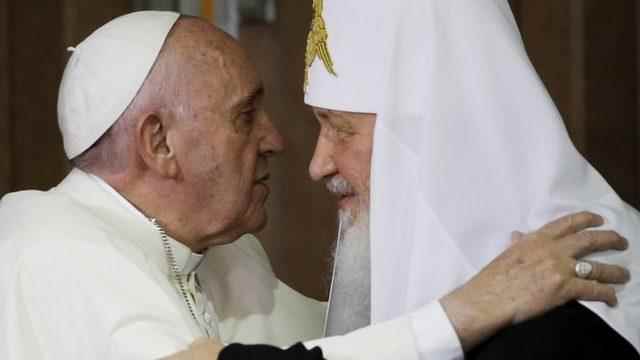The leader of the Catholic Church, Pope Francis, reacted to the journalists who accused him of being pro-Russian because he avoided mentioning the name of Russia or Vladimir Putin in his messages condemning the invasion of Ukraine. The Pope accused these journalists of disinformation and “coprofiling” (feces).
This accusation was revealed in a letter the Pope wrote on the subject to a journalist from his hometown of Argentina. Argentine journalist Gustavo Sylvestre published the Pope’s letter on his website.
In the letter dated April 7, the Pope expresses his concerns about the “disinformation campaign” being carried out in Argentina.
Complaining about the “heavy attacks of the media”, the Pope says:
“There are some sins that journalists tend to fall for: disinformation, slander, defamation, co-profiling.
“I was told that some authors get paid for these articles. It’s a shame! Such a noble profession like communication is polluted like this.”
Argentine journalist Gustavo Sylvestre stated that this correspondence took place in the context of “operations” in the local press to try to portray the Pope as close to Putin or Russia.
Pope Francis has previously described journalists’ disinformation as a “coprofile”. In an interview with the Belgian Catholic publication Tertio in 2016, he said that his desire to defame, give false information and create scandals was “to succumb to the coprofile disease”.
NYT: ‘Condemns the war but does not condemn the aggressor’
Since the beginning of the Ukrainian occupation, Pope Francis has repeatedly called for “to keep the guns silent”, condemning the war with terms such as “massacre”, “violence”, “terrible cruelty”.
Finally, the expression “Some rulers who provoke conflicts by being drawn to outdated nationalist interests” during his trip to Malta at the beginning of April was interpreted as a criticism of Russian leader Vladimir Putin.
However, the words “Putin”, “Moscow” or “Russia” in this context were not heard from the mouth of the Pope.
This choice drew a reaction from a segment, including some media outlets.
One of the most notable of these was the article titled “The Pope condemns the war in Ukraine, but does not condemn the aggressor”, published in the New York Times (NYT) last month.
The National Catholic Reporter (NCR), the “progressive Catholic” news site close to Pope Francis, also called on the Pope to directly mention Putin’s name in an editorial.
“Whatever is going on behind the scenes, it’s time for Francesco to tell the truth about the bloody attack on Ukraine as it stands. It’s time to speak clearly about Putin’s warmongering…” the NCR wrote.
Willingness to keep diplomatic channels open
Sources close to the Vatican, on the other hand, emphasize that behind the Pope’s not targeting Russia or Putin directly, lies his desire to keep the channels of diplomacy open.
There were suggestions from the Vatican to mediate the peace talks between Russia and Ukraine.
It is also known that Pope Francis wants to meet face to face with Patriarch Kirill of the Russian Orthodox Church, who made statements in support of the occupation.
Plans are being made for this meeting to take place in a country in the Middle East in the summer.
Reaction to the Good Friday ceremony plan
The Holy Friday ceremony, which the Pope will conduct tonight, has sparked a similar controversy.
It is planned that a Russian and a Ukrainian woman will carry a cross together in the “Way of the Cross” ceremony to be held at the Colosseum.
Andrii Yurash, Ukraine’s Ambassador to the Vatican, said that this plan causes concern among Ukrainians.
Ukrainian Catholic Church Archbishop Sviatoslav Shevchuk said he found the idea of Russian and Ukrainian women wearing crosses “inappropriate”.
“This plan puts Russia’s military offensive against Ukraine out of context,” Shevchuk reacted.
Antonio Spadaro, a Jesuit clergyman known for his closeness to the Pope and the editor-in-chief of La Civilta Cattolica, said in response to these reactions that the Pope acted “with a spirit of reconciliation”.
“Reconciliation between peoples can only be possible when the war is over and those who have committed crimes against humanity are convicted,” said Shevchuk, Archbishop of the Ukrainian Greek Catholic Church.
